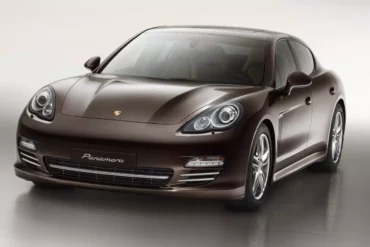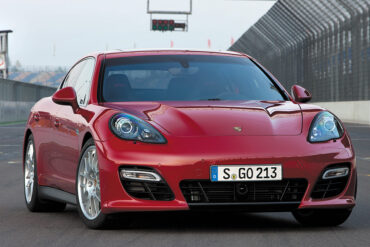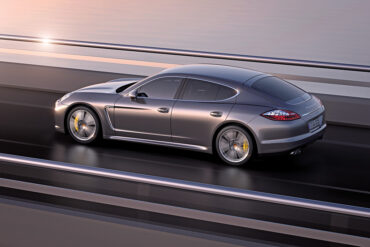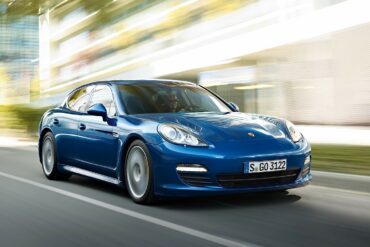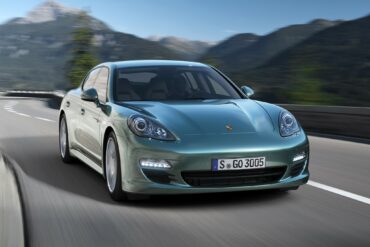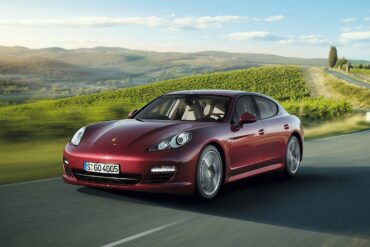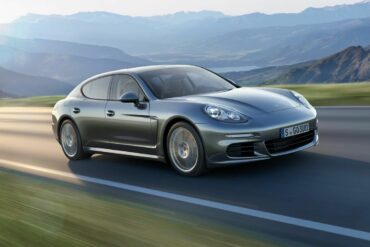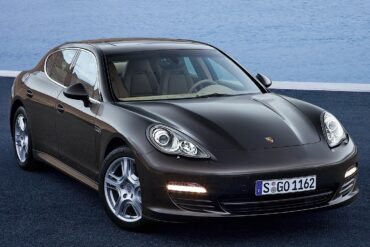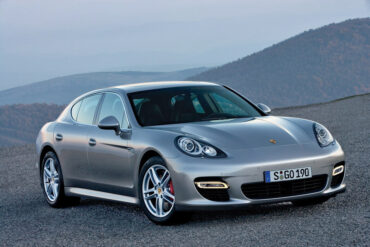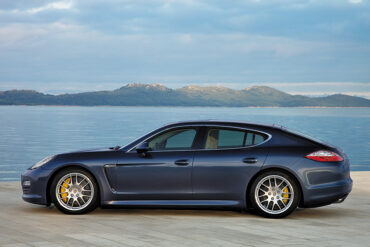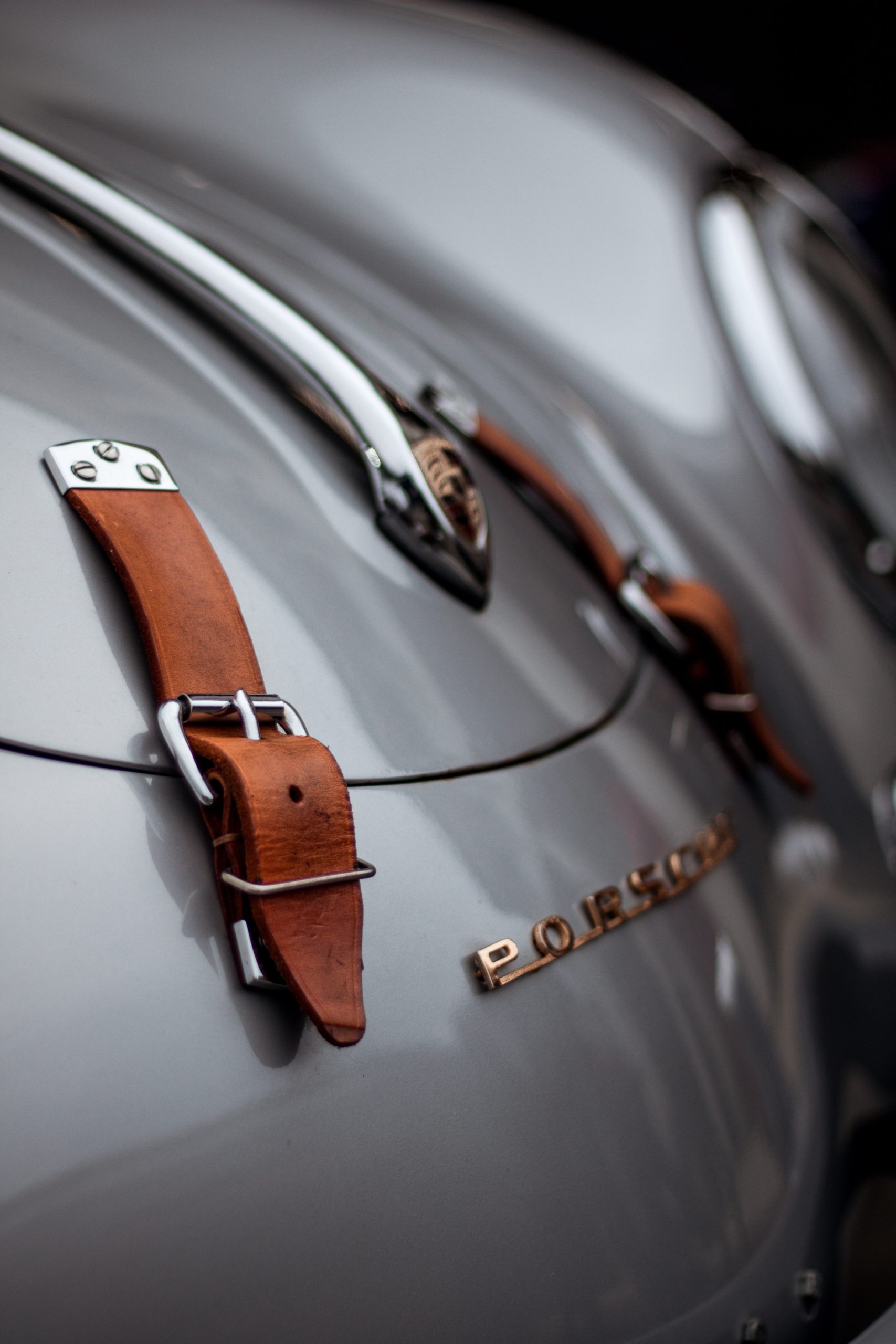Based as they are on the 300-hp V-6 Panamera and Panamera 4, the Platinum Edition is available with either rear- or all-wheel drive. Outside, the cars are separated from standard V-6 Panameras by platinum silver metallic trim. The shiny stuff covers the grille and rear diffuser accents, the lower half of the side mirrors, and the trunk trim. Porsche also throws in a set of 19-inch Turbo wheels and finishes the window trim in gloss black. A sport design steering wheel is standard, as well as Porsche crests on the front and rear headrests and “Platinum Edition” lettering on the doorsill trim.
The Panamera GTS was more like a detuned Turbo than an upgraded 4S. Its outside look was on a par with the Panamera Turbo, with large air intakes on the front and standard front section from the SportDesign package, that emphasized the sporty dynamics. On the front, the bi-xenon headlights had black inner bezels and featured four LED daytime running lights. In the rear, there was the same adaptive spoiler that deployed at speeds above 205 kph (121 mph).
The Turbo S featured the same 4.8-liter bi-turbo engine from the Turbo version, but with a new engine management system and improved turbochargers. The result was a 550 hp beast that could blast most of the supercars on the road with a 0-100 kph (0-62 mph) time of 3.8 seconds. It's all-wheel-drive and the Sport Chrono Package Turbo were standard features.
The Porsche Panamera S Hybrid marks the beginning of a new chapter of Porsche Intelligent Performance, continuing the success story of the four-door Gran Turismo. Not only is the new model the most economical Porsche of all time, it also outperforms by a mile all full hybrid production cars of its class, the luxury class, in terms of consumption and CO2 emissions. And at the same time, without any restrictions, it offers the sporty, exclusive character and custom comfort so typical of this unique Porsche Gran Turismo family.
In May 2011, Porsche unveiled the diesel version for its four-door Panamera. With the introduction of that version, it switched from a road runner to a long cruiser luxury sports-sedan. Porsche didn't want to lose that market and decided to offer a diesel version for the Panamera. Since the car was designed for long travels, a diesel engine would give it a range of over 1200 km (746 miles). After the initial shock of its regular customers, soon the orders started to pick-up.
The Panamera 4 was the entry-level all-wheel-drive version for the Panamera, the long-waited four-door Porsche. The Panamera's headlights resembled those installed on the Cayenne. The profile resembled an elongated 911 or the 989 concept-car. On the front fenders, two vents were used to extract the air within the wheel-well and decrease the front-lift effect. In the back, the taillights resembled those found in the Cayman. In the back, on the trunk-lid, a retractable wing was installed. It was automatically extended at speeds over 120 kph (74.5 mph).
The entry-level Panamera featured a 3.6-liter V6 engine carried-over from Audi. It was paired as standard to a 6-speed manual. A 7-speed PDK (dual-clutch) was on the options list. The base-model Panamera and Panamera 4 were introduced in 2010. While it came later than the initial variants, the base Panamera was no second class car. As a everyday passenger car it was plenty powerful with great luxury and plenty of standard features.
The rear-wheel drive and naturally aspirated 4.8-litre V8 make the first Panamera S a great all around passenger car with sports car energy. The Porsche Panamera 4S is an all wheel drive vehicle, with its engine placed in the front, and a 4 door saloon (sedan) body. The Porsche Panamera 4S belongs to the 970 range of cars from Porsche. Power is supplied by a double overhead camshaft, 4.8 litre naturally aspirated 8 cylinder motor.
As a top of the range version, the Panamera Turbo featured the same 4.8-liter V8 engine from the S-version, but with a pair of turbochargers that increased the power from 400 hp to 500 hp. It was available exclusively with a 7-speed automatic (PDK double-clutch) gearbox and all-wheel-drive. Inside, the Panamera Turbo designers took their inspiration from the Vertu luxury mobile phones, with high end appointments throughout. This is one quick and sporty sedan.
For the drivetrain, Porsche chose Cayenne as an inspiration model installing the 4.8-liter V8 engine under the hood. For the Panamera 4S, it fitted the car with an all-wheel-drive system and a 7-speed automatic (PDK – double-clutch) gearbox. The 400 hp Porsche 4-door hatchback was good for a 5-second run from 0 to 100 kph (0-62 mph).


